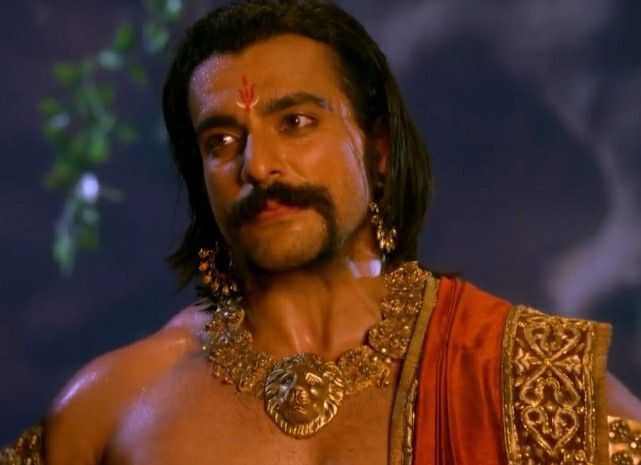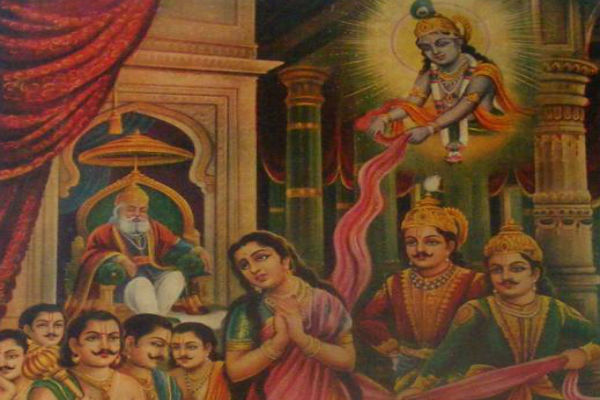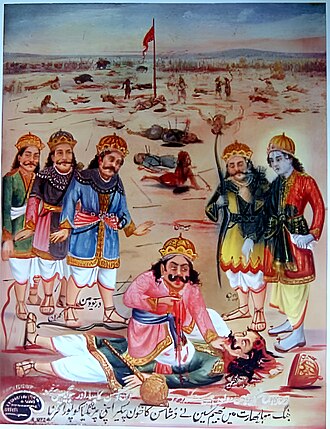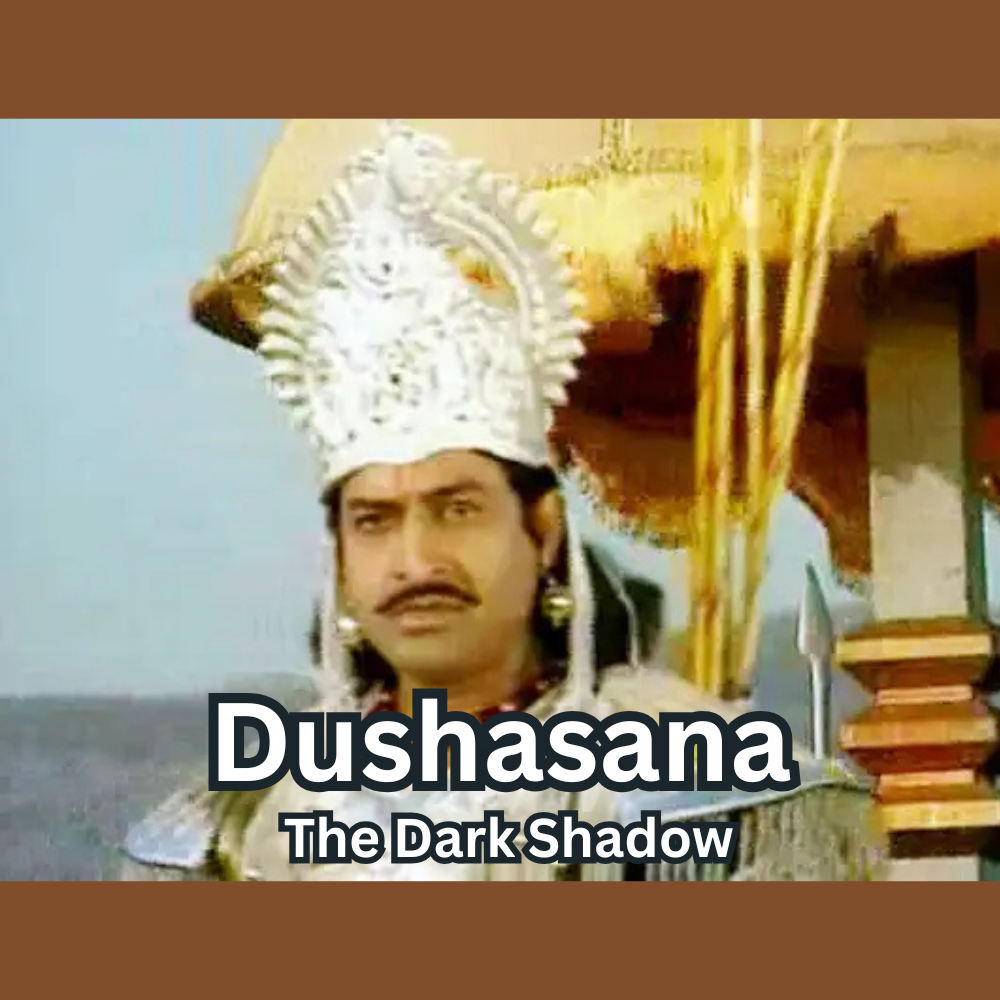Introduction
The Mahabharata, one of the greatest epics of all time, is filled with complex characters who embody a range of human emotions, virtues, and vices. Among these characters, Dushasana stands out as a figure deeply associated with arrogance, blind loyalty, and cruelty. He is often remembered for his role in the infamous disrobing of Draupadi, an act that sealed the fate of the Kauravas in the great Kurukshetra war. But who was Dushasana? What led him to commit such heinous acts, and what spiritual lessons can we learn from his story?

Who was Dushasana?
Dushasana was the second son of King Dhritarashtra and Queen Gandhari, making him one of the hundred Kaurava brothers. He was particularly close to his elder brother, Duryodhana, and served as his most trusted aide. Throughout the Mahabharata, he is depicted as a character who blindly follows his brother’s lead, regardless of morality or righteousness.
Dushasana’s name itself carries significance—’Dush’ means wicked, and ‘Asana’ means ruler, reflecting his nature as someone who engaged in unrighteous acts without questioning their consequences.
Dushasana’s Role in the Mahabharata

- The Game of Dice and Draupadi’s Disrobing One of the most defining moments of Dushasana’s character was his role in the gambling match arranged by Shakuni. After Yudhishthira lost everything, including his brothers and wife Draupadi, Duryodhana ordered Dushasana to bring Draupadi to the court. In an act of utter disrespect, Dushasana dragged her by the hair into the assembly and attempted to disrobe her publicly. However, Draupadi’s unwavering faith in Lord Krishna led to a divine intervention, saving her dignity. This incident remains a powerful lesson on karma and dharma, showing how arrogance and cruelty inevitably lead to downfall.
- Blind Devotion to Duryodhana Dushasana’s actions were largely influenced by his unwavering loyalty to Duryodhana. Instead of questioning his elder brother’s unethical decisions, he carried them out without hesitation. This blind loyalty led him down a dark path, reinforcing the idea that devotion, when misguided, can lead to destruction.
- Humiliation of Draupadi and its Consequences Dushasana’s brutal attempt to disrobe Draupadi not only enraged the Pandavas but also invoked divine wrath. Draupadi, in her anguish, vowed that she would not tie her hair until she washed it with Dushasana’s blood. This curse loomed over him throughout the war.
- The Kurukshetra War and Dushasana’s Fate During the great war, Dushasana fought bravely but was ultimately slain by Bheema. Bheema had sworn an oath to avenge Draupadi’s humiliation by drinking Dushasana’s blood. True to his word, Bheema tore Dushasana’s chest apart and fulfilled his promise, symbolizing the ultimate retribution for wrongdoing. This brutal end serves as a reminder that justice always prevails, no matter how powerful or protected one may feel.

The Spiritual Lessons from Dushasana’s Life
- The Dangers of Blind Loyalty Dushasana’s biggest flaw was his inability to think for himself. He followed Duryodhana blindly, believing in his brother’s twisted version of justice. This teaches us an important lesson—loyalty should always be rooted in righteousness. Following someone without questioning their actions can lead to destruction.
- Respect for Women and Dharma Dushasana’s disrespect towards Draupadi marked a turning point in the Mahabharata. It reminds us that karma spares no one. Respect for women is not just a virtue but a fundamental duty, and those who violate it will face dire consequences.
- The Unavoidable Consequences of Adharma Every act of cruelty, arrogance, and injustice brings forth its own punishment. Dushasana’s fate was sealed the moment he participated in Draupadi’s humiliation. The Mahabharata reinforces that even the mightiest warriors cannot escape their karma.
- The Power of Divine Protection Draupadi’s unwavering faith in Lord Krishna saved her from humiliation. This incident highlights the power of surrendering to the divine. No matter how dire the circumstances, true faith and righteousness always attract divine protection.
- Revenge and Retribution While the Mahabharata speaks of justice, it also teaches us about the dangers of revenge. While Bheema’s actions fulfilled a promise, they also showed the intensity of hatred and how it consumes one’s soul. The ultimate lesson is to rise above hatred and seek justice, not personal vendetta.
Conclusion
Dushasana’s story is not just about his misdeeds—it is a reflection of human flaws, misplaced loyalty, and the ultimate power of justice. His downfall serves as a timeless lesson for all of us: always choose righteousness over blind allegiance, respect every individual, and remember that the laws of karma are inescapable.
The Mahabharata is not just an ancient epic; it is a spiritual guide that teaches us how to navigate life. Dushasana’s life, though tragic and filled with adharma, reminds us of the importance of choosing the right path. His story is a warning against arrogance, injustice, and the belief that power can protect one from the consequences of wrongdoing.
Let us strive to be conscious of our actions, ensuring that our choices align with dharma rather than fleeting desires or misguided loyalty.

